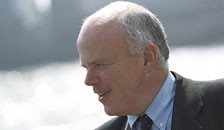The economy is heading for a brief recession rather than a long and painful one, according to HSBC’s senior economist Mark Berrisford-Smith, who will be delivering the keynote address at next month’s FN50 conference.
“My opinion is based on the fact that the starting point is so much better than previous economic downturns,” says Mr Berrisford-Smith.
We are much better equipped to get through it than we were in the downturns of the mid ’70s, the late ’70s to early ’80s, and the early ’90s.
“So my message to the FN50 audience will be that we need to take a longer term perspective. We have experienced worse in the past and it’s not all doom and gloom.
“There is good news out there. The price of oil is lower than it was a few months ago and therefore the price of fuel is lower. And inflation in the economy is now at its peak.
“The critical thing is whether we sort out the financial systems. If we can find a comprehensive solution then there are reasons to be optimistic.”
In fact, by the time this is published – or by the time of Mr Berrisford-Smith’s speech at the FN50 – there might be a solution in place. If that’s the case, he could be delivering the message “we are over the worst”.
But even if a ‘comprehensive solution’ is found, businesses are in for a tough time next year.
“The people sitting in boardrooms won’t have experienced a situation like this before,” says Mr Berrisford-Smith.
“They won’t have been in positions of seniority at the time of the last downturn. So for them, it will be the toughest they’ve known it.”
This is a view echoed by Peter Hollinshead, managing director of HSBC Vehicle Finance, who will be speaking alongside Mr Berrisford-Smith at the FN50.
“It’s an economic environment I’ve not seen before,” Mr Hollinshead says.
“It’s not one that I’ve experienced in my working life.”
So how is the economic situation affecting companies which operate in the fleet industry?
“It makes it more difficult for contract hire companies that have to borrow to fund their business,” explains Mr Hollinshead.
“This could have an impact for fleet managers that use contract hire.”
What trends are likely to emerge in the industry? Will we see more mergers and acquisitions, for instance?
“Well, we’re potentially seeing one at the moment with Lloyds TSB and HBOS.
"That has implications for Lex, which is owned by HBOS, and for Lloyds TSB Autolease.
“Inevitably there will be pressure on smaller providers and that could lead to mergers. I wouldn’t say that those mergers are more likely, I would just say that they are possible.”
The takeover could have implications for HSBC Vehicle Finance as its fleet is outsourced to Lex.
But Mr Hollinshead won’t be drawn on the issue, believing that it’s too soon to say.
Turning back to the economy in general, Mr Hollinshead is keen to point out that ‘banks are still open for
business’.
“Business is still being done where the proposals are right,” he says.
“The economy at some point will return to growth, but at the moment it’s very difficult to judge when that might be.”
And Mr Berrisford-Smith agrees: “We’ve no idea exactly when we’re going to be over the worst of it.
"We’re living in age of uncertainty which means that making plans in business is difficult.
"Most people don’t work in the City and so far the number of people that have lost their jobs is negligible. But the sheer uncertainty has a knock-on effect in terms of confidence. It brings unease.”
Mr Hollinshead’s advice to businesses is not to speculate.
“You can speculate all day long, but while you’re doing that you’re not concentrating on your core business,” he says.
“My advice is to concentrate on those things which you have direct control of and which you can influence.”
Has he seen any clever responses to the economic environment? Are there any clients taking the initiative?
“I’ve noticed that some companies are using mini-lease facilities, rather than committing to long-term leases.
“And some companies are giving journey management more thought.
“They are using video conferencing rather than face-to-face meetings, for instance.
"That keeps cars off the road, saves on fuel and is better in terms of duty of care.”
But what does journey management mean for company cars in the long-term?
“There will still be a place for the company car,” Mr Hollinshead says.
“Public transport isn’t viable when you need to fit lots of client visits into one day.”
And turning to next year, what impact will the CO2 emissions related tax have on leasing companies?
“We’re likely to see the mix of vehicles that leasing companies provide change.Leasing companies will need to be flexible.”
And perhaps flexibility is the answer to the economic gloom too.
To hear more from HSBC and other leasing industry experts, attend the FN50 conference on November 4.
















Login to comment
Comments
No comments have been made yet.